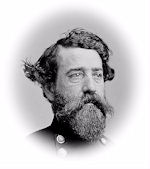HDQRS.
PROVISIONAL ARMY
CONFEDERATE STATES,
Charleston, S.C.,
March 11, 1861.
.
.
Hon. L. P. WALKER, Secretary of War, Montgomery, Ala. :
“I desire to state that should my application to be appointed in the Regular service, instead of the Provisional one, occasion any embarrassment to the President, I desire it to remain unnoticed; and, moreover, should he at any time consider it necessary for the good of the service or safety of the country to send here an officer of more experience than myself, I hope he will do so without hesitation, as I care more for the success of our arms and of our cause than for the honor of being in command here, and I would serve under the orders of such a commanding officer with the same zeal and activity as at present.”
SIR: I have taken the earliest opportunity my present duties would permit (yesterday) to make a thorough reconnaissance of the country south of this city to the Stono River and its mouth, to determine what works are required to prevent an enemy from approaching in that direction, either to throw re-enforcements during the night into Fort Sumter, through the Stono River, Folly River, or Light-house Inlet, and their numerous and intricate branches (see Bache’s maps of Charleston Harbor and adjacent coast and country), or to attack Charleston. I have selected the sites and ordered the construction of some field works that will, I think, effectually guard those channels of approach; but we must have time and means to complete them. With good assistants (chiefs of Engineers and Ordnance) this could probably be done in about eight or ten days; but Major Whiting and Captain Boggs (two most reliable and efficient officers) have been recalled to Savannah by the governor of Georgia, and I am again left to my own resources. Their absence fills me with care and grief, for other very important matters demand my attention; in fact, a great deal in the way of organization remains still to be attended to. I find a great deal of zeal and energy around me, but little professional knowledge and experience. I earnestly request the immediate return of the two officers just named, or that two others, of equal ability, if they can be procured, be sent me. Probably Capt. G. W. Smith, of New York, and Captain Gorgas might be induced to come, if a positive rank could be offered to them. Should an enemy succeed in effecting a landing on the Stono River (a very navigable stream), or anywhere else in that direction, I will take a position with all my disposable forces in a very advantageous location I have selected, a little in advance of the Savannah road bridge, leading into Charleston, covering, at the same time, the bridge with a tete-de-pont. From thence I will oppose to the last his direct attack, or take him in flank and rear, to cut off his communication, if practicable.
With regard to my letter of the 12th, referring to my present commission in the Confederate service, I desire to state that should my application to be appointed in the Regular service, instead of the Provisional one, occasion any embarrassment to the President, I desire it to remain unnoticed; and, moreover, should he at any time consider it necessary for the good of the service or safety of the country to send here an officer of more experience than myself, I hope he will do so without hesitation, as I care more for the success of our arms and of our cause than for the honor of being in command here, and I would serve under the orders of such a commanding officer with the same zeal and activity as at present.
I remain, sir, very respectfully, your obedient servant,
G. T. BEAUREGARD,
Brigadier-General, Commanding.
P. S.–Your letter of the 9th instant has just been received. Its remarks are answered in the above letter.
G. T. B.
![]()









